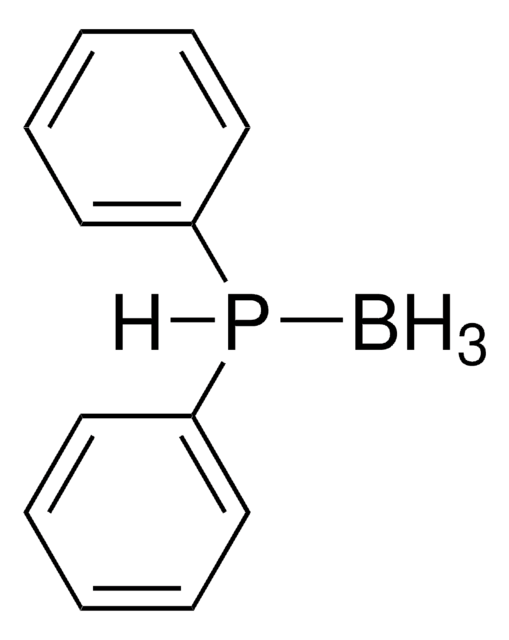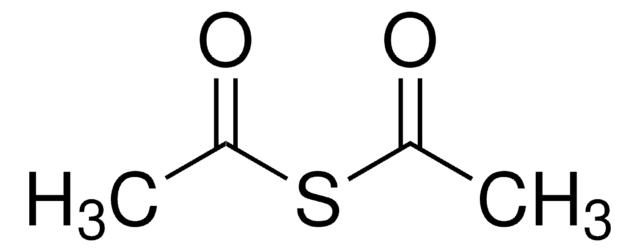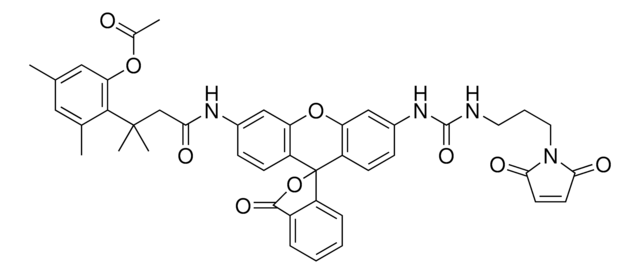670359
Acetylthiomethyl-diphenylphosphine borane complex
≥98.0%
Sinónimos:
(T-4)-[S-[(Diphenylphosphino-κP)methyl] ethanethioate]trihydroboron
About This Item
Productos recomendados
assay
≥98.0%
form
solid
reaction suitability
reaction type: click chemistry
reagent type: ligand
reaction type: Staudinger Reaction
mp
52-55 °C
functional group
phosphine
storage temp.
2-8°C
SMILES string
B.CC(=O)SCP(c1ccccc1)c2ccccc2
InChI
1S/C15H15OPS.BH3/c1-13(16)18-12-17(14-8-4-2-5-9-14)15-10-6-3-7-11-15;/h2-11H,12H2,1H3;1H3
InChI key
MXPNVFCCEGQGEN-UHFFFAOYSA-N
Application
- Traceless Staudinger ligation reagent with borane protecting group.
- The borane group stabilizes the phosphine against oxidation and can be easily removed with mild basic or acidic conditions to yield the active phosphine.
- After reaction with an azide, the phosphine is eliminated in the presence of water to yield a native amide bond.
- Used in the synthesis of cyclic peptides.

Packaging
Legal Information
related product
signalword
Warning
hcodes
Hazard Classifications
Eye Irrit. 2 - Skin Irrit. 2 - STOT SE 3
target_organs
Respiratory system
Storage Class
11 - Combustible Solids
wgk_germany
WGK 3
flash_point_f
Not applicable
flash_point_c
Not applicable
ppe
dust mask type N95 (US), Eyeshields, Gloves
Elija entre una de las versiones más recientes:
Certificados de análisis (COA)
¿No ve la versión correcta?
Si necesita una versión concreta, puede buscar un certificado específico por el número de lote.
¿Ya tiene este producto?
Encuentre la documentación para los productos que ha comprado recientemente en la Biblioteca de documentos.
Contenido relacionado
Professor Ron Raines works with Sigma-Aldrich on the development of reagents and tools for chemical biology such as the traceless Staudinger ligation reagent (670359). DTBA (774405), a superior biological reducing reagent to DTT, is another technology to come out of the Raines lab.
Professor Ron Raines works with Sigma-Aldrich on the development of reagents and tools for chemical biology such as the traceless Staudinger ligation reagent (670359). DTBA (774405), a superior biological reducing reagent to DTT, is another technology to come out of the Raines lab.
Professor Ron Raines works with Sigma-Aldrich on the development of reagents and tools for chemical biology such as the traceless Staudinger ligation reagent (670359). DTBA (774405), a superior biological reducing reagent to DTT, is another technology to come out of the Raines lab.
Professor Ron Raines works with Sigma-Aldrich on the development of reagents and tools for chemical biology such as the traceless Staudinger ligation reagent (670359). DTBA (774405), a superior biological reducing reagent to DTT, is another technology to come out of the Raines lab.
Nuestro equipo de científicos tiene experiencia en todas las áreas de investigación: Ciencias de la vida, Ciencia de los materiales, Síntesis química, Cromatografía, Analítica y muchas otras.
Póngase en contacto con el Servicio técnico









